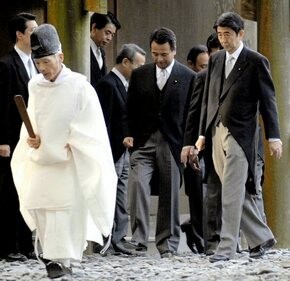hankyoreh
Links to other country sites 다른 나라 사이트 링크
[Analysis] Japan moves toward another term on U.N. Security Council

Japanese Prime Minister Shinzo Abe looked happy on January 24 after talking with Mongolian President Nambaryn Enkhbayar on the telephone. The approval rating for Prime Minister Abe's Cabinet has recently fallen to around 30 percent, but given the situation, he showed a sense of confidence. This was especially so because Prime Minister Abe had just received a long-awaited present from the Mongolian president: during the telephone conversation, President Enkhbayar said his nation would withdraw its candidacy for a non-permanent seat on the U.N. Security Council. He had reportedly urged Japan to run for the spot instead.
The U.N. Security Council consists of five permanent members and ten non-permanent members. Non-permanent seats are allocated to a few regions such as Asia, Africa, and Latin America. Iran also intends to run for a seat, but the nation is in a more disadvantageous position than is Japan because the Middle Eastern nation received a Security Council resolution to sanction it for its nuclear development.
Japan's two-year term as a non-permanent member expired last year. Japan, a nine-time non-permanent member of the Security Council, chaired the U.N. council when it led an effort to pass a resolution to sanction against North Korea last year. Japan, which dreams of becoming a permanent member of the U.N. Security Council, is hesitant to retire from a role which has given it a strong political voice. Because of this, Japan reportedly pledged Mongolia huge financial assistance to persuade the nation to abandon its aspirations for a U.N. seat. Junichiro Koizumi, then Japanese prime minister, visited Mongolia last summer to pledge assistance of US$350 million. Japan's last term on the council was made possible when Papua New Guinea withdrew its candidacy in 2004 due to financial problems.
Observers say Prime Minister Abe's recent remarks that non-members of the U.N. Security Council do not have a voice at the council seems to show the Japanese government's desire to influence the diplomatic process, even though it currently does not have a permanent position on the council.
Please direct questions or comments to [englishhani@hani.co.kr]
Editorial・opinion
![[Guest essay] Amending the Constitution is Yoon’s key to leaving office in public’s good graces [Guest essay] Amending the Constitution is Yoon’s key to leaving office in public’s good graces](https://flexible.img.hani.co.kr/flexible/normal/500/300/imgdb/original/2024/0416/8917132552387962.jpg) [Guest essay] Amending the Constitution is Yoon’s key to leaving office in public’s good graces
[Guest essay] Amending the Constitution is Yoon’s key to leaving office in public’s good graces![[Editorial] 10 years on, lessons of Sewol tragedy must never be forgotten [Editorial] 10 years on, lessons of Sewol tragedy must never be forgotten](https://flexible.img.hani.co.kr/flexible/normal/500/300/imgdb/original/2024/0416/8317132536568958.jpg) [Editorial] 10 years on, lessons of Sewol tragedy must never be forgotten
[Editorial] 10 years on, lessons of Sewol tragedy must never be forgotten- [Column] A death blow to Korea’s prosecutor politics
- [Correspondent’s column] The US and the end of Japanese pacifism
- [Guest essay] How Korea turned its trainee doctors into monsters
- [Guest essay] As someone who helped forge Seoul-Moscow ties, their status today troubles me
- [Editorial] Koreans sent a loud and clear message to Yoon
- [Column] In Korea’s midterm elections, it’s time for accountability
- [Guest essay] At only 26, I’ve seen 4 wars in my home of Gaza
- [Column] Syngman Rhee’s bloody legacy in Jeju
Most viewed articles
- 1Faith in the power of memory: Why these teens carry yellow ribbons for Sewol
- 2[Guest essay] Amending the Constitution is Yoon’s key to leaving office in public’s good graces
- 3[Editorial] 10 years on, lessons of Sewol tragedy must never be forgotten
- 4[Guest essay] How Korea turned its trainee doctors into monsters
- 5Korea ranks among 10 countries going backward on coal power, report shows
- 6Final search of Sewol hull complete, with 5 victims still missing
- 7[News analysis] Watershed augmentation of US-Japan alliance to put Korea’s diplomacy to the test
- 8K-pop a major contributor to boom in physical album sales worldwide, says IFPI analyst
- 9World famous Korean instant noodle: truth and misconceptions
- 10Japan ramps up efforts to remilitarize, integrate with US to deter China